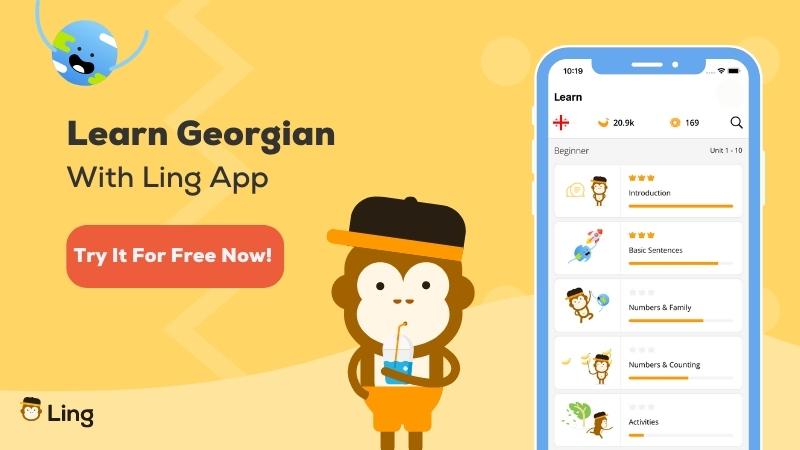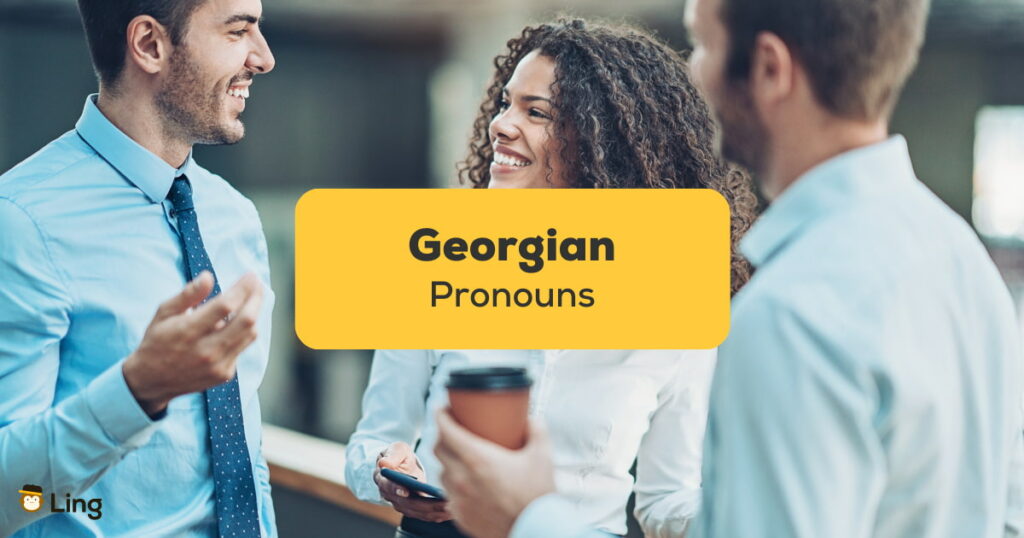I, you, they, she, it. These are just some of the pronouns you’re already familiar with. Just like verbs, pronouns are essential in any sentence as they can be both subjects and direct objects. But as you study the Georgian language, you’ll encounter its distinctive use of pronouns in everyday sentences. Don’t blink; we have a lot to cover in this Georgian pronouns article!
A pronoun is a part of speech that takes the place of the subject (mainly nouns) in a sentence. They are essential in sentences as they remove repetition and even provide context to the readers about what is being talked about or what is happening.
In the Georgian language, there are different rules, such as adding another word or letter (such as a plural suffix) to distinguish pronouns. It requires daily practice for someone who wants to familiarize themselves with the pronouns of Georgian before moving on to the conjugation of verbs. In particular, you’ll need this lesson first before you check the four cases of verbs such as transitive verbs, intransitive verbs, medial verbs, and indirect verbs.
So if you’re excited to learn more about listening, speaking, writing, and reading grammar for Georgian in the right way, then we present the ultimate beginner’s guide to learning Georgian pronouns.
Are There Gender Pronouns In Georgian?
Georgian is unique when it comes to their pronouns. Like Turkish, Hungarian, Estonian, and Russian, they possess no gender pronouns or only have small instances of using these genders in possessive forms. In fact, Georgian is an agglutinative language, meaning it can use a prefix or a suffix to create one word that talks about a personal pronoun or several object pronouns. They also use another gender-neutral term that acts as a description of the subject. But how do they know which one is talking? It depends on the context and other markers of the verb or adjective. You’ll understand the pattern once you’ve tried creating real conversations with a speaking partner or through your flashcards.
So now that it is clear, let’s move on to the seven types of Georgian pronouns for creating your sentences.
Which Georgian Pronouns Should You Remember?
At first, you may think that pronouns are as hard as verb classes. But in this situation, Georgian has a much faster way of memorizing their words. That is because they often use the same pronoun for the nominative, ergative, dative, genitive, instrumental, adverbial, and vocative cases.
Yes, just like in English, Georgians have cases for pronouns, which are also made of singular and plural forms. Buckle up as we will discuss what words make up the possessive pronoun and the personal, relative, interrogative, demonstrative, reflexive, and indefinite pronouns in Georgian.
Georgian Personal Pronouns
Georgian Personal Pronouns or ქართული პირადი ნაცვალსახელები (kartuli p’iradi natsvalsakhelebi) are pronouns that usually replaces the noun to avoid repetition in sentences. Personal pronouns only replace nouns and function as the subject or object of a clause, phrase, or sentence. Personal pronouns can also have plural forms.
Here are the six personal pronouns you’ll work with when constructing Georgian sentences:
| English | Georgian | Romanization |
| I/me | მე | me |
| You | შენ | shen |
| They/Them | მათ | mat |
| She/He/It | ის | is |
- She ranks third in her school ის თავის სკოლაში მესამე ადგილზეა. is tavis sk’olashi mesame adgilzea.
You can also classify Georgian personal pronouns according to their point of view. These are First person, Second person, and Third-person pronouns. For the first personal pronouns, me (მე), shen (შენ), and is (ის) are used for the singular case. The second personal pronouns consist of shen and tkven. For the third person, it’s always man, mat, or is, while adding their suffix markers.
The plural marker for most pronouns is –eb, which is placed between the base word and the case marker. For example, კ’აცები (men) is from the word კაცი (man) while adding the suffixes –eb (ებ) and –i (ი) to transform it to the nominative case.
Here is the complete table of Georgian pronouns with their first, second, and third personal pronouns.
| Cases | Nominative | Ergative | Dative | Genitive | Instrumental | Adverbial | Vocative |
| First-person (singular) (I/me) | me (მე) | me (მე) | me (მე) | chem(s) | chemit | chemad | |
| Second person (singular) (You) | shen | shen | shen | shen(s) | shenit | shenad | she! |
| Third person (singular) (He/She/Her/Him) | is | (i)man | (i)mas | (i)mis | (i)mit | imad | |
| First person (plural) (They/Them) | chven | chven | chven | chven(s) | chvenit | chvenad | |
| Second person (plural) (you) | tkven | tkven | tkven | tkven(s) | tkvenit | tkvenad | tkve! |
| Third person (plural) (Those) | isini | (i)mat | (i)mat | (i)mat | (i)mat | (i)mat |
Georgian Possessive Pronouns

There are two types of possessiveness: possessive pronouns and possessive adjectives. Possessive pronouns (მფლობელობითი ნაცვალსახელები mplobelobiti natsvalsakhelebi) expresses possession or ownership of an object. Independent possessive pronouns may stand alone in sentences. On the other hand, dependent possessive pronouns are used as a determiner and dictate ownership between a person and the noun placed after the pronoun. Dependent pronouns can also become possessive adjectives. However, many people often use possessive adjectives incorrectly. Pronouns with adjectives in their possessive forms can also be the indirect object.
| English | Georgian | Romanization |
| My/Mine | ჩემი | chemi |
| Our | ჩვენი | chveni |
| His/Her/Hers | მისი | misi |
| Their/ Theirs | მათი | mati |
- Their handphones were confiscated earlier. მათი ხელის ტელეფონები ადრე ჩამოართვეს. mati khelis t’eleponebi adre chamoartves.
Georgian Relative Pronouns
Relative pronouns (ნათესავი ნაცვალსახელები natesavi natsvalsakhelebi) are mostly known as adjective ends or clauses that give us additional information about the subject. It joins two clauses together, mainly dependent and independent clauses. The relative pronoun depends on what kind of noun they are describing.
Georgian relative pronouns are the same as the English grammatical structure. It consists of the following words:
| English | Georgian | Romanization |
| Who | ვინ | vin |
| Which | რომელიც | romelits |
| What | რა | ra |
| That | რომ | rom |
| Whom | ვინს | vins |
If you want to make relative pronouns more colloquial, you need to use the word რომ rom.
- He is a person who treats people kindly.
ის არის ადამიანი, ვინ კეთილად ეპყრობა ადამიანებს.
is aris adamiani, vin k’etilad ep’q’roba adamianebs.
- The boy is the leader of the band which will perform next week
ბიჭი იმ ჯგუფის ლიდერია, რომელიც მომავალ კვირას გამოვა
bich’i im jgupis lideria, romelits momaval k’viras gamova.
Georgian Interrogative Pronouns
Interrogative pronouns (კითხვითი ნაცვალსახელები k’itkhviti natsvalsakhelebi) are what we use for describing specific actions, results, or a person that is being talked about. Interrogative pronouns can be the subject of the sentence but can also be the direct object. However, indirect objects that are interrogative pronouns can also act as the sentence’s main subject.
| English | Georgian | Romanization |
| Which | რომელიც | romelits |
| What | რა | ra |
| Whose | ვისი/რომლის | visi/romlis |
| Who | ვინ | vin |
| Whom | ვინს | vins |
For example:
- I wonder who will deliver your food tomorrow? მაინტერესებს ხვალ ვინ მოგაწოდებს საკვებს? maint’eresebs khval vin mogats’odebs sak’vebs?
As you can see, some words may seem similar to relative pronouns but perform different roles.
There are also specific interrogative pronouns that Georgian uses, such as:
| English | Georgian | Romanization |
| What kind? | რა სახის | ra sakhis |
| Where from/from where? | საიდან? | saidan? |
| When from/From when? | როდიდან | rodidan |
| How much? | რამდენი | ramdeni? |
Georgian Demonstrative Pronouns
What are demonstrative pronouns (ჩვენებითი ნაცვალსახელი chvenebiti natsvalsakheli)? A demonstrative pronoun replaces nouns to point to specific people or things. It can either be the subject or the object of a sentence. In addition, it also becomes an adjective, verb, or conjunction, depending on the context.
| English | Georgian | Romanization |
| This | ეს | es |
| That | რომ | rom |
| These | ესენი | eseni |
| Those | იმათ | imat |
| This kind | ამ სახის | am sakhis |
How do you know if a demonstrative word is a pronoun or an adjective? Always remember that pronouns replace nouns while adjectives describe these nouns or pronouns.
- This used to be the car that I loved driving. ეს იყო მანქანა, რომ მართვაც მიყვარდა. es iq’o mankana, rom martvats miq’varda.

Georgian Reflexive Pronouns
Georgian reflexive pronouns (რეფლექსური ნაცვალსახელები repleksuri natsvalsakhelebi) refer to nouns (person or thing) that are both the subject and object of the verb are the same in a sentence. Derived from the word reflects, reflexive pronouns reflect the subject or subject markers in the sentence.
| English | Georgian | Romanization |
| himself/herself/itself | თავად | tavad |
| myself | თავს | tavis |
| ourself/ourselves | საკუთარ თავს | eseni |
| yourselves | ჩემთვის | chemtvis |
| themselves | საკუთარი თავის | sak’utari tavis |
- He has to pay the penalty himself.
მან თავად უნდა გადაიხადოს ჯარიმა.
man tavad unda gadaikhados jarima.
- I can prepare myself.
მე შემიძლია საკუთარი თავის მომზადება
me shemidzlia sak’utari tavis momzadeba
Georgian Indefinite Pronouns
Indefinite pronouns don’t refer to a specific noun (person, place, or thing). It becomes a quantifier placed before a noun to show the specific amount of that object being described or considered. On the other hand, indefinite pronouns can also be distributive, where a specific noun is referred to separately from the whole group.
Generally, indefinite pronouns have -body, -thing, -where, and -one as their word endings.
| English | Georgian | Romanization |
| another | სხვა | araperi |
| one thing | ერთი | erti |
| anybody | ვინმეს | vinmes |
| everything | ყველაფერი | q’velaperi |
| nobody | არავინ | aravin |
| everywhere | ყველგან | q’velgan |
| nowhere | არსად | arsad |
| each | თითოეული | titoeuli |
| either | ან | an |
| neither | არც ერთი | arts erti |
- He thinks nobody will attend the celebration.
ის ფიქრობს, რომ ზეიმს არავინ დაესწრება.
is pikrobs, rom zeims aravin daests’reba.
- There is another person in this room who needs help.
ამ ოთახში არის კიდევ სხვა ადამიანი, რომელსაც დახმარება სჭირდება.
am otakhshi aris k’idev araperi adamiani, romelsats dakhmareba sch’irdeba.
Now that you’ve seen the basics of Georgian pronouns, it’s time to learn how to use them properly. We’ve written an easy guide on how to construct Georgian sentences. Remember that pronouns are vital in Georgian conversations. So, if you follow the singular or plural forms of these words we’ve mentioned, you’ll sound like a native.
There is a better way to practice Georgian pronouns, though – through language-learning apps. But it shouldn’t be an ordinary app without short conversations to practice with. In that case, keep reading on to download the best app you need right now, the Ling app!
Enrich Your Next Lesson With The Ling App!

Pronouns may look like there are a bunch of rules to follow, but don’t get discouraged! There are plenty of ways to memorize your pronouns by formulating more words and becoming familiar with your vocabulary. In that case, we have the best solution for you.
Start learning the Georgian language with the Ling app. It contains 60+ languages with over 200+ lessons to make your language learning journey faster. You’ll be introduced to basic words and sentences that will help you introduce yourself in Georgian. Later on, you can practice with an AI chatbot too! Download the Ling app now on the Play Store or App Store to test your language skills and
‘Till the next lesson!


































































